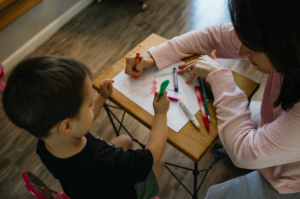
Learning a second language can provide a lifetime of potential benefits. From improving your child’s existing language skills to being able to more fully appropriate other cultures, there are many advantages to raising bilingual children.
Better Language Skills
Learning the different structure, rules and vocabulary of other languages can help children to more fully master their own native tongue. Learning a second language helps to ensure that your child can grow into a more powerful and confident communicator. Language skills that are learned early in life can make a huge difference in the years to come.
When you learn your mother tongue you learn through observation. When you learn another language you are both immersed, but also learn that language has rules, structures, and processes. This makes you have to realize that your mother tongue has these processes as well. Learning a second language helps you be aware of the linguistic rules, sounds, and conjugations your mother tongue.
Scholastic Opportunities
Every parent wants to provide their child with the best education possible. From college applications to opportunities to study abroad, knowing an additional language can unlock many doors. Teaching children a new language may hold the key to ensuring they are able to enjoy greater scholastic success.
When your children grow older they will have more colleges and scholarships to choose from. More companies that can hire them. More jobs and a better understanding of the way their chosen industry works worldwide. Being able to communicate with more people has benefits in the playground and in business.
Broadening Horizons
Bilingual child care centres may have much to offer. Learning a new language can teach children a great deal about the world around them. For parents who have concerns regarding the narrowness of their child’s outlook or experiences, picking up a second language can be a smart move. Doing what you can in order to expand your child’s horizons is a responsibility that no parent should ignore.
Language learning requires learning about a culture. Because language is so interwoven into the way a culture experiences the world around them you gain keen insights. There are old theories that language learning will confuse children or show disgust towards their mother tongue. The opposite is true. When a child learns another language and is immersed in a different culture they gain appreciation for what they have. They learn compassion, skills, and to see the world in a different light.
Social Opportunities
Social opportunities matter a great deal in life. Knowing a second language means being able to communicate with more people which can in turn lead to additional opportunities. From personal travel to future career opportunities, enhanced communication skills and abilities can pay off in a surprising number of ways.
This means being able to befriend kids in the playground. This means being able to communicate abroad if their parents move for work. It means being able to enjoy more music, television, and entertainment. It opens up a new world of possibilities.
Cultural Appreciation
Language skills can also play a huge role in understanding another culture. Not all works of literature and the arts can be easily translated. Exploring the history of a people or learning more about the values and concepts that inform their culture can be a much easier proposition for those who already speak the language. Knowing a second language makes teaching your child about the world around them that much easier.
Learning about another culture’s values and insights first makes you have to wonder what a value or insight is. This becomes introspective and gets children thinking about the world around them. This is a skill that is needed to be able to keep their creative and strong minds agile.
Getting Started Early
Language skills are more easily learned and understood early in life. Being raised bilingual can allow your child to achieve a degree of mastery that might have been all but impossible once they achieve adulthood. Bilingual children also have a much easier time when it comes to picking up a third or even forth language.


